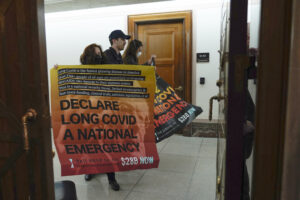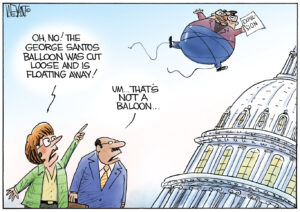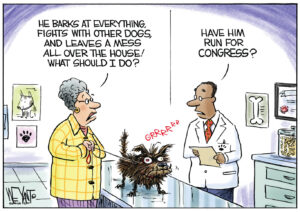A New Balance Toward Liberty
The hardest thing in an argument is to acknowledge competing truths.
The hardest thing in an argument is to acknowledge competing truths. We know that our government will continue with large-scale surveillance programs to prevent future terrorist attacks. We also know that such programs have operated up to now with too little public scrutiny and insufficient concern over their long-term implications for our rights and our privacy.
The response to Edward Snowden’s leaks about what our government has been up to should thus be a quest for a new and more sustainable balance among security, privacy and liberty. And the fact that some people in each of our political parties have switched sides on these questions is actually an opportunity. We can have a debate on the merits, liberated from the worst aspects of partisanship.
A good place to start would be the bill introduced on Tuesday by Sen. Jeff Merkley, D-Ore., requiring the attorney general to declassify significant opinions by the Foreign Intelligence Surveillance Court. To have a thoughtful discussion, we need to know what authority our government has, and claims to have, under the Patriot Act and the Foreign Intelligence Surveillance Act (FISA).
Merkley notes that his bill was carefully drawn to protect intelligence “sources and methods.” It focuses on the release of the court’s substantive legal interpretations. Among the bill’s seven other sponsors are two Republicans. One of the pair, Sen. Dean Heller of Nevada, said in a statement that “ensuring Americans’ safety is one of our government’s most important responsibilities.” The FISA court bill is “a measured approach” toward more transparency.
Other disclosures are also called for. Sen. Dianne Feinstein, D-Calif., chairs the intelligence committee and is a strong defender of the surveillance programs. She has requested that Gen. Keith Alexander, the director of the National Security Agency, declassify more material so we can know those instances where data mining efforts might have stopped terrorist plots. Here again, citizens are entitled to know more than we do now.
My hunch is that few Americans were entirely shocked at the extent to which the intelligence services have been ingesting huge gobs of information. We already know that our privacy is compromised by the gathering of Big Data by institutions outside government. As Ross Douthat noted in a perceptive New York Times column on Sunday, “it is practically impossible to protect your privacy … from the service providers and social media networks.”
And let’s face it: The vast majority of Americans were ready to let Washington do almost anything in the wake of Sept. 11, 2001, to safeguard us from further harm. The ardent civil libertarians who resisted the Patriot Act were a tiny minority. Russ Feingold cast the lone, brave vote against it in the Senate.
That we’re now more inclined to question the national security state should not surprise us. “In the period immediately after the attacks of 9/11, the American people were willing to give the government broad power to keep them safe,” Sen. Jack Reed, D-R.I., one of Congress’ most thoughtful voices on national security, said in an interview. “Now, more than a decade later, it’s entirely appropriate that Americans are asking about the balance between security and privacy.”
Reed believes we still need extensive surveillance programs. But he was also in the minority last December in supporting an earlier version of the Merkley proposal on the FISA court decisions. He also favored another amendment, proposed by Sen. Ron Wyden, D-Ore., that would have required the director of national intelligence to submit a report to Congress and the public on the impact of the revised FISA law on the privacy of American citizens.
This is not, in short, an all-or-nothing debate. We can be far more mindful of privacy and liberty than we have been without gutting the government’s ability to stop future attacks. And I’m not bothered by polls showing that the views of many Republicans and Democrats on the liberty/security spectrum vary depending on whether their own party is in power. Is it so remarkable that people trust those they voted for more than the people they opposed?
Of course we need a rule of law that applies no matter who is president. Still, these surveys reflect an intelligent ambivalence: We want to be safe and free. We realize in our gut that achieving both is a balancing act.
We cannot give up on vigilance, but now is the time to lean more toward liberty. We also need to recognize that while trade-offs rarely inspire soaring rhetoric, they just happen to be necessary.
E.J. Dionne’s e-mail address is ejdionne(at)washpost.com.
© 2013, Washington Post Writers Group
Your support matters…Independent journalism is under threat and overshadowed by heavily funded mainstream media.
You can help level the playing field. Become a member.
Your tax-deductible contribution keeps us digging beneath the headlines to give you thought-provoking, investigative reporting and analysis that unearths what's really happening- without compromise.
Give today to support our courageous, independent journalists.






You need to be a supporter to comment.
There are currently no responses to this article.
Be the first to respond.